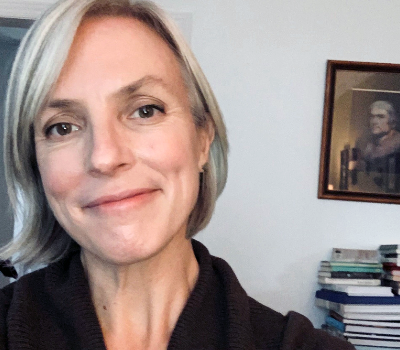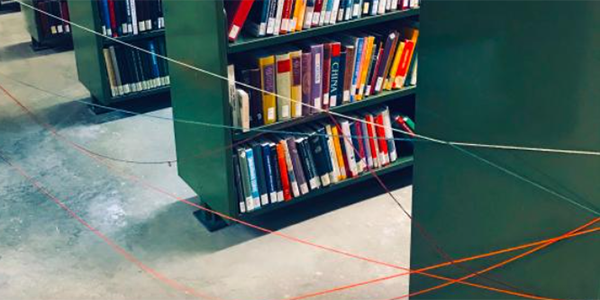FIMS News
Contact Information
FIMS Communications
Becky Blue
Email
519-661-2111x88493
FIMS & Nursing Building
Rm 2060C
There is no structure in art because art is free - and that is why art is remembered
 By Suzanne Elshorafa
By Suzanne Elshorafa
July 2022
Professor Melissa Adler's most recent project, Useful and Beautiful, works to dismantle the information spaces she has spent much of her research career critically analyzing.
How do you dismantle a system built on patriarchal, heteronormative settler-colonial ideologies? You use feminist, queer and colonial work to think differently about these systems. In 2019, FIMS Assistant Professor Adler received an Insight Grant from the Social Science Humanities Research Council for a project titled Desire in Sight: Aesthetic of knowledge organization (since retitled as Useful and Beautiful).
Useful and Beautiful combines common library rhetoric coupled with the beauty of artistic methods. Libraries are often characterized as useful and the inherent value of a library often lies in numbers, such as how many books have been checked out or how many people have visited the library. Adler suggests there is value in libraries that cannot be measured in this way.
“What happens when people are in the stacks, and they find that book or encounter something that gets them fired up? Because that is something that happens in the library. It is not measurable, but it is beautiful.”
 Adler is using artistic techniques to enter the realm of what is possible and to explore the new ways we can think about knowledge. She has been intentional about who she approached about contributing, wanting to work specifically with library workers, archivists, and students. She talked to people about ideas for projects and invited them to make and write things: “I gave them this frame and said, ‘let's think about knowledge organization through artistic and creative methods.’”
Adler is using artistic techniques to enter the realm of what is possible and to explore the new ways we can think about knowledge. She has been intentional about who she approached about contributing, wanting to work specifically with library workers, archivists, and students. She talked to people about ideas for projects and invited them to make and write things: “I gave them this frame and said, ‘let's think about knowledge organization through artistic and creative methods.’”
Together, the group set about reimagining information spaces through a variety of creative productions such as stories, visual art, sound productions, essays, and even weavings. The results of their investigations can be seen on their Useful + Beautiful website. Even while being forced to work separated and at home because of the COVID-19 pandemic, the team generated a rich collection of materials.
key Takeaway
People working in roles not traditionally thought of as creative (librarians, archivists, museum staff) are poets, artists, playwrights, makers, tinkerers, and writers, who have a capacity to use creative techniques to address colonial and patriarchal knowledge organization structures.
Useful and Beautiful is a two-pronged research project that builds on Adler’s previous and current work. Her current work titled Informing Empire: Knowledge Organization in Thomas Jefferson’s Information Age investigates Thomas Jefferson’s information systems and technologies and the way he chose to organize information. And previous work examining the Library of Congress concluded that we must think of libraries as powerful societal influencers because the way in which information is organized affects how we encounter and understand the information we use each day. For example, Indigenous history is often classified as belonging to the “pre-Columbian” era, a false narrative that perpetuates ignorant ideologies.
Using the findings from these past projects, Adler and her team are now creatively and collaboratively dismantling and reimagining libraries, archives and museums as spaces that are creative, inviting, and open, rather than measured, inflexible spaces created within a heteropatriarchal, settler-colonial and white-supremist ideology.
“I think these academic, historical and critical projects serve a purpose in this broader project of dismantling and decolonizing. Where you do that dismantling, it opens space for thinking differently and creatively. That is what I think is needed and this project is a realization of that,” she explains.
Often, information spaces are divided and do not encourage the use of imagination. Using art to organize information provides an entry for larger conversations about how we structure, connect, and relate to our world.
Professor Adler's reseach team includes: Hazel Jane Plante, Ana Diab, Elizabeth Livingstone, Emily Drabinski, Amanda Belantara, Erin MacIndoe Sproule, Greg Nightingale, Gretchen Alexander, Julia Bell, Ioana Dragomir, Marnie James and Shawn(ta) Smith-Cruz.
----
This profile is part of a series written by graduate students in MMJC 9604 Professional Writing, during the Winter 2022 term. Profiles have been edited by FIMS Communications staff for clarity.
Image of the library green library shelving is from the Useful and Beautiful website.


